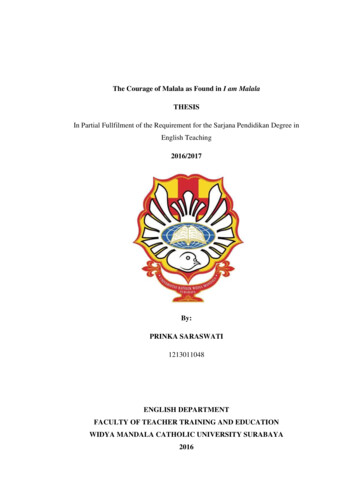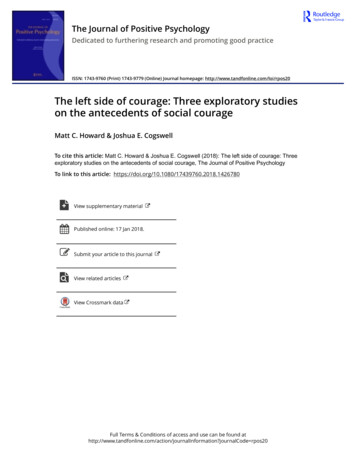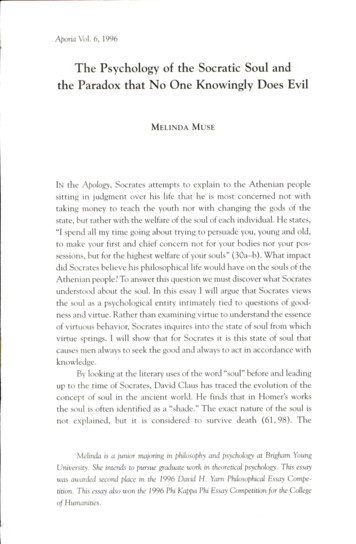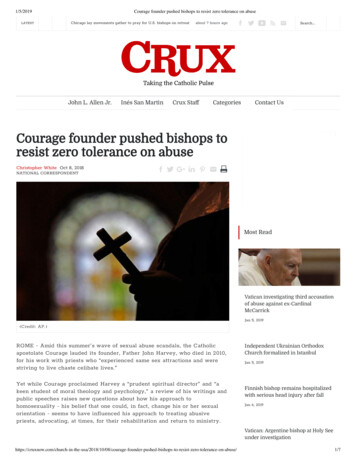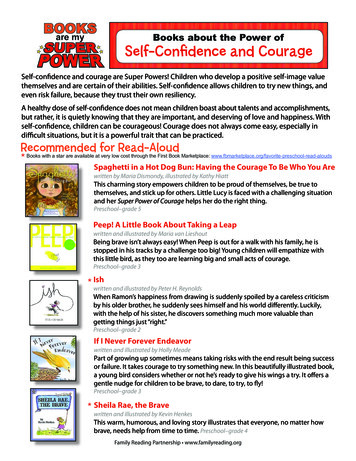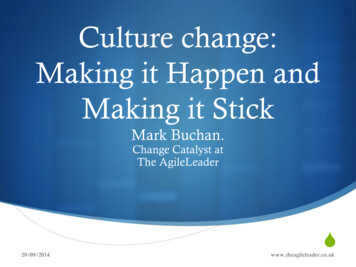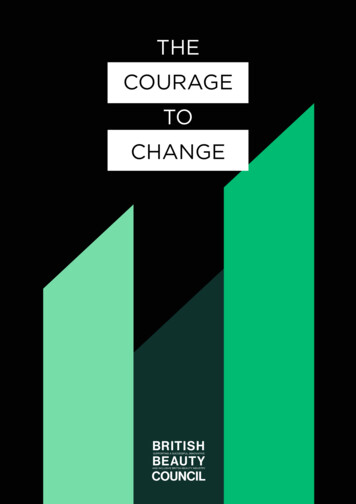
Transcription
THECOURAGETOCHANGE
THE COURAGE TO CHANGE BRITISH BEAUTY COUNCILCONTENTSLETTER FROM MILLIE AND ANNA1EXECUTIVE SUMMARY31. THE CASE FOR CHANGE51.1 “I WANT YOU TO ACT AS IF THE HOUSE IS ON FIRE”1.2 DECLARING A CLIMATE EMERGENCY1.3 THE BUSINESS CASE FOR CHANGE1.4 CONSUMERS ARE LOOKING FOR INDUSTRY LEADERSHIP1.5 CONSUMER ENGAGEMENT WITH SUSTAINABILITY2. OUR CURRENT IMPACT112.1 WHAT GOES IN 2.2 WHAT COMES WITH 2.3 AND WHAT COMES OUT 3. THE WIDER MOVEMENT FOR CHANGE153.1 THE BIGGER VISION FOR PEOPLE AND PLANET3.2 LEARNING FROM OTHER INDUSTRIES4. WHAT’S ALREADY UNDERWAY194.1 COLLABORATING EFFECTIVELY FOR CHANGE4.2 CREATING POSITIVE IMPACT THROUGHOUT THE VALUE CHAIN4.3 WORKING WITH THE WHOLE TEAM TO EFFECT POSITIVE CHANGE5. ENVISIONING A BEAUTIFUL INDUSTRY235.1 AIMING HIGH; SETTING INDUSTRY-WIDE STANDARDS5.2 SPEAKING A CLEAR AND COMMON LANGUAGE5.3 PRESERVING BIODIVERSITY5.4 OPTIMISING WATER USE5.5 CONSUMING BEAUTY RESPONSIBLY6. RECOMMENDATIONS296.1 COLLABORATION ACROSS THE INDUSTRY6.2 THE WORK OF THE SUSTAINABLE BEAUTY COALITION6.3 ACTIONS FOR BEAUTY BUSINESSES6.4 ACTIONS FOR CONSUMERSAPPENDICES35
THE COURAGE TO CHANGE BRITISH BEAUTY COUNCILTO ALL OF US2020 IS THE YEAR THAT THE WORLD CHANGED,FOREVER. The global pandemic brought into sharp focusso much about our ways of being that need to change inorder for our communities and our planet to recover andthrive. This comes hot on the tail of global climate strikesand Black Lives Matter protests. We cannot go backto the way things were. This is our chance to makethings better.The beauty industry has at its heart the belief that truebeauty is intrinsic to each one of us and to the world welive in – our job is to ensure that this beauty can shine.We must work together to make this change and we mustwork with the urgency that the situation demands. Weknow now that extraordinary change can happen fast. Itwill take commitment, courage and collaboration if weare to reach our highest goals.We have commissioned this sustainability report, witha focus on the environment, to set us on the rightpath. The analysis and recommendations are based onnew Beauty British Council commissioned researchconducted by Hubbub10, desk research of the manyinitiatives that already exist, interviews with voices insideand outside the industry and a think tank discussion with40 participants.In the following pages, we lay out a vision of how wecan move forward together to create an industry thatnurtures the planet that we love and all that live on it.We urge you to join us on this journey.Best,Anna & MillieAnna Teal is CEO, Aromatherapy Associates and British Beauty Council Pillar President for InnovationMillie Kendall MBE is CEO, British Beauty Council–1–
THE COURAGE TO CHANGE BRITISH BEAUTY COUNCILHEADLINE SPONSORSCreate Amazing–2–
EXECUTIVESUMMARYPhoto by Javardh on Unsplash
THE COURAGE TO CHANGE BRITISH BEAUTY COUNCILEXECUTIVE SUMMARYFrom the global pandemic, to Black Lives Matterprotests, to unprecedented forest fires, 2020 is provingto be a year that won’t let us hide from the havoc wehave reaped on planet earth.Everyone has a part to play in turning things around. Thebeauty industry perhaps more than most because itspurpose is to encourage the intrinsic beauty of peopleand our planet to shine.The industry must play its part in bringing about bold,urgent change.Consumers are keen to see this happen. They arelooking to the industry to take a lead. Around two-thirdsof consumers want brands to do more in helping theircause to improve the planet.They are also willing to do their part. Of those surveyedwho changed beauty products in the three months fromApril to July 2020, 1 in 7 bought a new product as theywanted to use a more environmentally friendly product/brand. The research also highlighted that already takinga number of actions to be more considerate of theenvironment in the use of their beauty and groomingproducts. For example 70% of those surveyed reportedthat they currently turn the tap off when brushing theirteeth/ washing their face.The industry is taking steps towards a more sustainablefuture. There are a growing number of examples ofbrands taking significant steps to reduce the negativeimpact of the ingredients they use, be more transparentabout how they source their raw materials, changepackaging to reduce & recycle and use water moreresponsibly.However, theseuncoordinated.effortsarestilltoopatchyWe must move forward with courage. We must moveforward together, from the smallest independent, to thelargest corporate brand. This is imperative if the industryis to step up when the beautiful, bountiful planet wedepend on needs us.AND SO WE ARE CALLING FOR: The industry to collaboratethrough a SustainableBeauty Coalition. Individual brands to domore to improve theimpact of their productsand support consumersto make better choices. Consumers to choosepositively impactfulproducts, to use themwisely and to engage withbrands on the issues theycare about.and1 in 7“Be courageous.It’s one of theonly places leftuncrowded.”people changedto moresustainablebeauty productsin the lastthree months.Anita Roddick, Founder,the Body Shop–4–
THE CASEFOR CHANGEPhoto by Justus Menke on Unsplash
THE COURAGE TO CHANGE BRITISH BEAUTY COUNCIL“I WANT YOU TO ACT ASIF THE HOUSE IS ON FIRE”- Greta ThunbergSo demanded Greta Thunberg of those collected atDavos in January 2019 and of the rest of the world.1She was speaking of the urgent need to make widereaching and fundamental changes to halt the negativeimpacts of human activity on our planet.Nearly two years later the movement she speaks forcontinues to gather momentum. Consumer awarenessis growing as information and understanding spread.People are using their purchasing power to put pressureon brands to change. As younger people gain inspending power this pressure will only increase.The global pandemic has shifted this dynamic furtherstill. People are buying what they need not what theydesire. There is a growing interest in consuming moreresponsibly. Consumers want to know how brands areuseful to society.For beauty brands, the risk of not changing is startingto outweigh the risk of changing, uncertain and fraughtwith challenges as it may be.Hard won protections, such as against animalcruelty, are being worn away by changes in legislationand practice.Intersectional environmentalism (see Definitions) issurging to the forefront.“We are past the pointwhere incremental changeis appropriate. Now is thetime for drastic and radicalsystematic change.” - Arizona MuseDisadvantaged individuals and communities suffer theimpacts of climate change and environmental harm firstand hardest.The beauty industry must acknowledge all of thesefactors in the path it takes to putting out the fire.While the implications of climate change andbiodiversity loss once seemed distant possibilities,they are increasingly affecting the beauty industry intangible ways.There is a universallyacknowledgedneed to keep globaltemperatureincrease below6,000,000PEOPLE PARTICIPATED INA GLOBAL CLIMATE STRIKEIN SEPTEMBER 2019.21.5 C.3–6–
THE COURAGE TO CHANGE BRITISH BEAUTY COUNCILDECLARING A CLIMATEEMERGENCYOn 1 May 2019, the UK Parliament declared a climateemergency. As a result, the Government’s aim is “toramp up ambition towards a climate-resilient, zerocarbon economy.”4 The UK was the first major economyto legislate for net zero emissions by 2050.Worth 28.4 billion in 2018, the British beauty industrymakes up 1.3% of the country’s GDP.5 It has the potentialto play a powerful role in achieving our nationalsustainability goals.As an industry, beauty touches every single UK citizenin some way, whether as an employee, a supplier, aninvestor or a consumer. With health and wellbeingat its core, the industry has unique scope to speak toindividuals. It can offer inspiring leadership to catalysechange that will ripple far and wide.It will involve collaborating with those in the industry’swider ecosystem, so that everyone is able to makedecisions that are good for the planet.“We can turn the beautyindustry into something that’sreally positive, so that we cansay hand on heart that ourindustry is a force for positivechange in the world.”- Jayn Sterland, WeledaSuch leadership demands that the industry engageswith this work because of a fundamental belief that itis the right thing to do. We have to acknowledge theclimate and ecological crisis that the world is facing.It will take courage and resolve because sometimes itwill mean making difficult decisions. It will challengebrands to think differently about their relationshipswith consumers and their supply chain. It may meancompletely rethinking their business model.1,765jurisdictions in 30countries have declareda climate emergency,covering 820million citizens.6CLIMATEEMERGENCY–7–
THE COURAGE TO CHANGE BRITISH BEAUTY COUNCILTHE BUSINESS CASEFOR CHANGEOnce a predominantly long-term concern, or thoughtof as unnecessary expenditure, changing conditions arebringing sustainability-related issues to the forefront ofbusiness considerations.these new challenges can give rise to unexpected gains.Lab-based or synthetic alternatives, for example, canbe far more cost-effective than extracting or harvestingraw materials.Supply chain vulnerabilities, highlighted even furtherby the global pandemic, are being exacerbated byenvironmental changes resulting from climate changeand biodiversity loss.Consumer purchasing decisions are increasinglyinformed by sustainability concerns. Unilever has foundits purpose-driven brands are growing at twice the rateof its other product lines.8Ingredients, both rare and more common, are beingaffected by changing weather patterns and overconsumption. Increases in flooding and droughtare heavily impacting not only agriculture, but alsomanufacturing.Access to water is a growing challenge. This is ofparticular concern to the beauty industry, which is sucha high volume user. Scarce resources are expensive ones,so it will make less and less business sense to persistwith outdated practices.B Corp certified brands in theUK grew 28 times faster thanthe national economic growthof 0.5% in 2018.9The global natural beauty market is estimated to hit 17billion by 2024.10The economic benefits of responding positively tothese challenges are also emerging. Research suggeststhat companies experience an average internal rate ofreturn of between 27% and 80% on their low carboninvestments.7Savings can be unlocked by changes in practice drivenby sustainability concerns – often through operationalefficiencies.7 Encouraging innovation in response toResearch suggeststhat companies experiencean average internal rate ofreturn between 27% and 80%on their low carbon investments.7“The momentfor an expandedview of valuecreation has come.”The value at stake fromsustainability concerns can beas high as 70%Michael Porter andMark Kramer,Creating Shared Valueof earnings.7–8–
THE COURAGE TO CHANGE BRITISH BEAUTY COUNCILCONSUMERS ARE LOOKINGFOR INDUSTRY LEADERSHIPConsumers are concerned about the impact of theirbeauty products, from cruelty to animals, to packagingand recycling.There is much that consumers are ready and willing todo. The global pandemic has enhanced this further. Inthe three months from April to July 2020, the Hubbubsurvey identified that 1 in 7 people have changed to amore environmentally friendly cosmetic product.11Researchbysustainabilityagency, Futerra, found that 88%of consumers want brands to “This isn’t about what consumersdo more to help them make a want and expect now, we needto be looking ahead to thedifference. This includes:consumer expectations of the Use less packaging.future. If we don’t do that, we Display clearer information on how to recycleproducts.won’t survive.” - Phil Cumming, WBA Provide information on more environmentally friendlyways to use products.Part of the answer lies in more fundamental consumptionchoices. Almost a third of consumers are prepared tobuy fewer cosmetic products to reduce theirenvironmental footprint.11This suggests that there are exciting opportunitiesto explore what this dynamic means for some ofthe fundamental aspects of how the beauty industrydoes business.However, people struggle to make good decisionsfor a number of reasons. About a third believe it istoo expensive to make the switch. Around a third ofconsumers would be prepared to pay more for somechanges, including: Fair-Trade ingredients, Sustainable palm oil or substitutes, Refillable containers and in-store refill optionsThe beauty industry has the power to galvanisemore sustainable choices and behaviours amongits customers.1 in 31 in 5people don’tunderstand theingredients in thebeauty productsthey use.people don’tknow how tocheck a product’ssustainabilitycredentials.–9–
THE COURAGE TO CHANGE BRITISH BEAUTY COUNCILCONSUMER ENGAGEMENTWITH SUSTAINABILITYEXPECTATIONSBEHAVIOURSThe main priority for people when choosing cosmeticsis trusting the brand.Research from Garnier found that 56% of Britishpeople currently don’t recycle bathroom waste such asshampoo, conditioner and shower gel bottles simplybecause it’s inconvenient to do so.13Unilever found 90% of Gen Zconsumers expect brands todo more to help reduce climateimpact and improve the state ofthe world.In a survey conducted by Hubbub with 3,000representative UK adults, 39% of people thinkthat brands should produce more environmentallyfriendly products.11However, there is considerable willThe Hubbub research identified that:tochange. 31% of people would be willing to reduce the numberof products they buy. 59% of people say they would be willing to refill theirbeauty and grooming products. 40% are prepared to use reusable cotton pads ora flannel.11The research identifies consumers’ top environmentalconcerns as cruelty to animals, too much plastic orunrecyclable packaging and ocean pollution.Lack of transparency is a problem. Two thirds of peoplearen’t clear which cosmetic products can be recycled.100%“Can’t decidewhat’s in most of themand what impact theywill have on my skin so Ino longer purchase beautyproducts”Survey respondent, HubbubsurveyOver96%of peoplebelieve theirown actionscan makea difference.1256%of Brits don’trecycle bathroomwaste like shampoo,conditioner andshower gel bottlessimply becauseit’s inconvenient todo so.1341%of consumers feel guiltyabout the environmentalimpact of beauty andgrooming products.110%– 10 –
OUR CURRENTIMPACTPhoto by Brian Yurasits on Unsplash
THE COURAGE TO CHANGE BRITISH BEAUTY COUNCILWHAT GOES IN.INGREDIENTS FROM NATURESYNTHETIC INGREDIENTSArgan to frankincense, sandalwood to vetiver.The beauty industry is a celebration of the manyand varied natural ingredients that can be found aroundthe world.The complex ingredients list of many products highlightsthat a significant number of synthetic chemicals arepresent. These can cause harm when released into thenatural environment.Unsustainable production, for example of palm oil,is leading to extensive destruction of natural habitatsthrough industrial deforestation. Many alternatives, suchas coconut, soy bean and rapeseed, themselves havea significant negative impact as they are less efficientto produce. 14For example, oxybenzone used in sunscreen is destroyingcoral reefs around the globe. Whether washed off in theshower or ocean, it is extremely potent – a single dropin six and a half Olympic-size swimming pools is enoughto be deadly.16Over-consumption, non-regenerative farming practices,pollution, waste and neglect are all threatening thedelicate balance of ecosystems and with it, the fates ofplants, insects, birds and animals. A recent WWF reportsuggests wildlife populations have plummeted 68%since 1970 and continue on this trajectory.14Animal cruelty is the mostsignificant environmental issuefor consumers according to theHubbub research.11Ingredients like parabens cause harm once they arewashed off and into our river and ocean systems.Concerns have been raised on the impact of syntheticingredients on aquatic life. Ingredients such as parabensare commonly found in both marine animals and UKfreshwater, more research is needed to find out the fullcost to our environment. Using these fossil fuel-basedingredients has a significant carbon footprint. Unileverestimates that 46% of its carbon footprint arises fromthe ingredients in its products.17Cutting down ahectare of trees releases6,000tons14,000tonsof CO2 into theatmosphere.15of sunscreencollect in theworld’s reefseach year.18– 12 –
THE COURAGE TO CHANGE BRITISH BEAUTY COUNCILWHAT COMES WITH.PLASTIC & PACKAGINGFrom microbeads to pump-action soap dispensers,plastics play a central role in shaping, preserving anddelivering beauty products. However, we are all keenlyaware of the damage plastic is doing to our oceansand wildlife.Plastic is accumulating in the oceans of the planetso quickly it is predicted that by 2050 the mass ofplastic in the world’s oceans will exceed the mass of allthe fish.“If current levels of consumptioncontinue, by 2050 there willbe 12 billion tons of plastic inlandfills, equivalent to 35,000Empire State Buildings.”- UN Environment ProgrammeOther forms of packaging are not without negativeimpact. For a start, packaging forms 70% of theindustry’s waste.19 Cardboard and paper packagingcontributes to the loss of 18 million acres of forest eachyear.20Every year, 120 billion units ofpackaging are produced by theglobal cosmetics industry.12WATERThe most commonly used ingredient in beauty products,water makes up about 70% of most products.22 Largequantities are also required for the manufacturingof many of the synthetic materials that go intothe products.It is present at every stage of a product’s life, fromcreation to use to disposal. The scale of demand forwater is not always proportional to the amount availablein the regions where it is being used.The average British person can use up to 142 litres ofwater a day.23 The water we use with products in thebath, shower or sink, as well as in processing andmanufacturing, washes into our rivers and oceans. Withit go chemicals, toxins and other pollutants that aredamaging vital ecosystems that we all depend on.“Water is set tobe a preciouscommodity asconsumptionoutstrips supply.”25Water poverty is setto impactMinteltwothirdsof the populationby 2025.24– 13 –
THE COURAGE TO CHANGE BRITISH BEAUTY COUNCILWHAT COMES OUT.WASTEPOLLUTIONWaste in the beauty industry manifests in many ways.Product design is often driven by sales and marketingpriorities, rather than sustainability considerations.There is a growing understanding of the contribution ofbeauty products to air pollution. Recent research hasfound that perfumes, hairsprays and deodorants pollutethe environment as much as car emissions.28There are numerous examples of the use of glass, plasticand other materials that are unrecyclable because oftheir colour, composition and design – chosen to enticeor convenience consumers. These end up in landfills.The drive to sell more means that people buy thingsthey don’t need or want. Almost two thirds of peoplehave unused or partly used beauty products in theirhome that they no longer want.Most people have been given a beauty product as a giftthat they will never use.10Single use items, such as razors, wet wipes and cottonbuds, as well as “minis” are all responsible for creatingunnecessary waste, much of which has the potential toend up in our oceans or earth.Processes used to extract the raw materials foringredients and plastics are having deadly impacts onthe natural environment. This includes the side-effects offracking, used to extract fossil fuels, such as the releaseof toxins into the land and waterways. The dangerousprocesses required to produce plastics also create risksof chemical leaks and fires, which can damage the areasaround the processing plants.29Other industries, such as agriculture and transport,are increasingly heavily regulated, leaving the beautyindustry as an ever more significant source of pollutants.British people use 1.1 billion wetwipes and 1.8 billion plasticstemmed cotton buds a year.27A pot of moisturiser takes1,000years to decompose.26– 14 –Scented productsemit the samelevel of chemicalvapours as vehiclepetroleum emissionsfrom cars.28
THE WIDERMOVEMENTFOR CHANGEPhoto by Callum Shaw on Unsplash
THE COURAGE TO CHANGE BRITISH BEAUTY COUNCILTHE BIGGER VISIONFOR PEOPLE & PLANETBy committing to collective action to reduce negativeand increase positive impact on the environment andclimate change, the British beauty industry is part of aglobal movement for change.Science-based targets are a way of making a contributionto reducing global emissions to keep warming belowthe 2 degrees Celsius goal and pursue efforts to limitwarming to 1.5 degrees Celsius.The Sustainable Development Goals, the “world’s ToDo list for a better and more sustainable future for all,”were adopted by all UN Member States in 2015 as partof the 2030 Agenda for Sustainable Development. The17 transformational goals are a call to action to promoteprosperity while protecting the planet.30Planetary boundaries describe the “safe operatingspace for humanity,” setting out limits which cannot becrossed if earth is to remain habitable in terms of factorsincluding biodiversity loss, deforestation and water andair pollution.31At the SDG Summit in September 2019, with progresslagging, world leaders called for a Decade of Action.At the Paris climate conference in 2015, countriesadopted an international agreement, known as the ParisAgreement to address climate change that aims tolimit global temperature rise to 2 degrees Celsius, whilemaking best efforts to keep it to 1.5 degrees Celsius.2Economist, Kate Raworth based her “Doughnut”economic model on these planetary boundaries, and aseries of social foundations that set limits below whichhumans cannot thrive, for example in terms of access tofood and clean water.32L’Oreal for the FutureIn June 2020, L’Oreal released its new sustainabilitystrategy, which is explicitly based on respect forplanetary boundaries.34– 16 –
THE COURAGE TO CHANGE BRITISH BEAUTY COUNCILLEARNING FROMOTHER INDUSTRIESCollaborations across businesses in other industrieshave succeeded in developing focused initiatives thatdrive collective action to areas with greatest potentialfor meaningful impact.Brands from across the fashion and textile sectorssigned the Fashion Pact committing to a common coreof key environmental goals in three areas: stoppingglobal warming, restoring biodiversity and protectingthe oceans. The Sustainable Apparel Coalition35 bringstogether members from across the fashion industryto collectively measure and improve social andenvironmental impacts.Almost 200 banks have signed the Principlesfor Responsible Banking, while over 3,000 businesses inthe investment sector have signed up to the Principlesfor Responsible Investment.36 Both initiatives setout principles to establish industry-wide behaviouralnorms and to drive continuous improvement inbusiness practices.It is only through collaboration (partnership is the 17thSustainable Development Goal) that companies cantackle the highly complex problems that beset individualindustries and make the systemic changes needed.“There is no ‘Plan B’ because wedon’t have a ‘Planet B’.”- UN Secretary-General Ban Ki-MoonTo be most effective, the plan of action for the beautyindustry must focus on where the industry can effectthe greatest change – the issues that are material to theimpact that it has.For the beauty industry, the areas of greatestenvironmental impact relate to the following SustainableDevelopment Goals:All of these initiatives deliberately harness the power ofcollective action by companies within a sector.– 17 –
THE COURAGE TO CHANGE BRITISH BEAUTY COUNCIL“ What mattersis that todaywe can be moreconfidentthat this planetis going to bein better shapefor the nextgeneration.”- Barack Obama on signingthe Paris Agreement– 18 –
4WHAT’SALREADYUNDERWAYPhoto by Larm Rmah on Unsplash
4THE COURAGE TO CHANGE BRITISH BEAUTY COUNCILCOLLABORATINGEFFECTIVELY FOR CHANGEThe challenges may be huge, but the beauty industryconnects so many people from all around the world.From farmers to lorry drivers, shop assistants to makeup artists to someone taking a shower in the morning,there are opportunities for everyone who works inthe beauty industry, or uses its products, to makea difference.New Plastic Economy(Ellen MacArthur Foundation)More than 850 organisations united behind acommon vision and targets for a circular economyfor plastic.37By taking a lead, the beauty industry can rally amovement of people behind a clear vision for theimpact that it wants to have. Together, brands fromacross the industry have the resources, knowledgeand skills to achieve the kinds of substantial andfundamental changes that the situation demands.This begins with a commitment from brands to do thiswork, and do it together.There are already examples of exciting collaborationsthat are making significant progress in the beautyindustry and beyond which can provide models tobuild on.To make the positive difference, at the pace thatis required, there needs to be a bold commitment inline with the scale of the challenge, a shared frameworkfor action and collaboration across the industry todeliver it.“The industry stands for making people feel goodabout themselves. This manifests itself in many ways.It might be treating yourself to a lipstick, but it goesmuch deeper than that. The footprint that you leavebehind is in many ways at the core of feeling goodabout yourself.” - Anna Teal, WBADriving Towards a Net Positive Cosmetics Industry(Cosmetic, Toiletry and Perfumery Association &Forum for the Future)The Association is bringing members togetherto share best practice and drive system-widechange.39SPICE(L’Oreal & Quantis)Twenty four global members co-createmethodologies and tools to drive the future ofsustainable packaging for cosmetics.38– 20 –
THE COURAGE TO CHANGE BRITISH BEAUTY COUNCILCREATING POSITIVE IMPACTTHROUGHOUT THE VALUE CHAINSome brands are already collaborating to drive changewith stakeholders at all stages of their business. Startingwith raw materials at the early manufacturing stages,right through to working with retailers and consumers toensure safe use ad disposal of the products they buy.ENGAGING SUPPLIERS IN THE SUSTAINABILITYJOURNEYThe scale and variety of businesses in the supply chainoffers enormous opportunity to generate positivechange. Unilever developed a Sustainable AgricultureCode to encourage sustainable sourcing, create supplychain security, and manage the environmental footprintfor the 7 million tons of agricultural raw materials it usesto make its products.40Beauty brand BYBI uses an internal ingredient gradingsystem to give a ‘weighted green score’ on parameterssuch as biodegradability, presence of ethical suppliers,energy consumption in harvesting, the labour forceinvolved, etc.MORE ACCOUNTABILITY FROM RETAILERSSelfridges recently launched Project Earth whichaims “to radically change the business” promotingsustainability throughout its operations. Such initiativesstart to challenge destructive patterns of endless newproduct launches, confusing marketing and the push forunnecessary consumption.Retailers have enormous influence over what consumersbuy, and by extension, on what products brands create.Cult Beauty is working with Provenance to provideverified information about the products they sell.43By being transparent, and communicating clearly,it gives consumers confidence in their buying decisions,and connects them with beauty brands that sharetheir values.“In a way we never couldhave predicted, the cycle ofconsumption has been brokenby the pandemic, markinga moment of change in ourcustomers to a more consideredmindset and requiring us to setnew expectations for retail.”- Anne Pitcher, Global ManagingDirector of Selfridges Group42In 2018 the BritishCosmetics Industrycontributed 5.9 billionto UK GDP alongsideits domestic supplychain.41– 21 –
THE COURAGE TO CHANGE BRITISH BEAUTY COUNCILWORKING WITH THE WHOLE TEAMTO EFFECT POSITIVE CHANGEIN THE BOARD ROOMIN THE STAFF ROOMWhen Natura bought Avon in 2019, it became the fourthlargest global cosmetics business and the one of theworld’s largest B Corps.44 They are blazing a trail. WhenAvon’s Directors voted to sell, they became the first suchcompany to overturn shareholder primacy in favour ofcorporate governance designed to create sustainablevalue for all stakeholders.Over 70% of business leadersrecognise that a strong companypurpose drives innovation andnurtures employee satisfaction.The businesses practices we have long taken for grantedare being profoundly challenged by alternative modelsthat are succeeding not only by their own, sustainabilityfocused standards, but in terms of revenue and profit.It can even increase productivity by around 30%.46Between2005 and 2018, investments insustainability-based strategiesgrew by 6,417%.45Investors are recognising this too.An engaged and motivated staff team has an exciting roleto play in identifying opportunities for change. Whetherthis is educating themselves to support customers tomake better choices, reviewing procurement processesor undertaking more sustainability-informed newproduct development.People find real meaning in their jobs when they canwork with others in pursuit of something like a journeytowards greater sustainability, which makes a positivedifference to people and planet.“Our staff are our ambassadors. When a consumerspeaks to a team member on the shop floor, that’swhere they’re getting their information from.” - TeresaHavvas, The Advisory &“Our aspiration is tobuild not just the bestbeauty company in theworld, but the best beautycompany for the world.”Roberto Marques, ExecutiveChairman of the Boardof Directors and Group CEO,Natura&Co88%of studies foundcompanies adheringto social orenvi
The beauty industry must acknowledge all of these factors in the path it takes to putting out the fire. “I WANT YOU TO ACT AS IF THE HOUSE IS ON FIRE” “We are past the point where incremental change is appropriate. Now is the time for drastic and radical systematic


